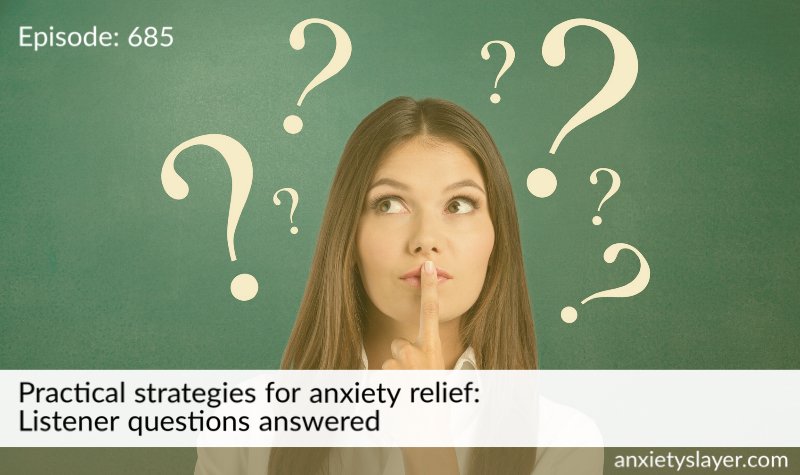685: Practical strategies for anxiety relief: Listener questions answered
This week on the Anxiety Slayer podcast we are answering listener questions about some of the practical anxiety calming strategies we’ve shared over the last few weeks. Listen in!
Anxiety Slayer is sponsored by BetterHelp
If you had an extra hour in your day what would you do?
A lot of us spend our lives wishing we could carve out more time for ourselves. And often feel like we simply don’t have the ability to claim this spaciousness.
One of the best ways to add something to your calendar is to identify what’s important to you, and make it a priority. I’ve made it a regular practice to schedule personal time in my calendar every day for self-care. What will you create time for?
Therapy can help you learn to set boundaries and uncover what’s important to you so you can enjoy more of what brings you joy. It isn’t just for those who’ve experienced major trauma.
If you’re thinking of starting therapy, give BetterHelp a try. It’s entirely online. Designed to be convenient, flexible, and suited to your schedule.
Visit BetterHelp.com/slayer today to get 10% off your first month.
Questions answered in this episode:
Q1: I've tried diaphragmatic breathing before, but I struggle to do it consistently. Do you have any tips for incorporating it into my daily routine?
Follow a regular schedule: Set aside specific times each day to practice diaphragmatic breathing, such as in the morning before starting your day or in the evening before bed.
Use reminders: Set alarms or notifications on your phone to prompt you to take a few moments for breathing exercises throughout the day.
Integrate it into activities: Practice diaphragmatic breathing while doing other relaxing activities, like stretching, yoga, or listening to calming music, to make it feel more natural and enjoyable.
Q2: The 5-4-3-2-1 grounding technique sounds interesting, but I'm worried I won't remember to do it when I'm feeling anxious. How can I make sure I remember to use it in those moments?
Do it when you don’t feel anxious: Get into the habit of practicing the 5-4-3-2-1 technique during moments of calmness or relaxation so that it becomes more automatic when you're feeling anxious.
Create visual reminders: Write down the steps of the grounding technique on a small card or piece of paper and keep it in your wallet or on your phone so you can easily reference it when needed.
Share with a friend: Tell a friend or family member about the grounding technique and ask them to remind you to use it when they notice you're feeling anxious.
Q3: I'm intrigued by EFT Tapping, but I'm not sure how to start. Are there any resources or tutorials you recommend for beginners?
Online tutorials:We have a step-by-step course called EFT Tapping for Anxiety Relief available at anxietyslayeracademy.com. And Guided SOS Tapping Sessions where we talk you through exactly what to do on our Patreon.
Books and guides: The Tapping Solution by Nick Ortner is a good introduction, Ananga’s book The Art and Science of Emotional Freedom is available as an ebook on our Patreon.
Professional guidance: Consider seeking out a certified EFT practitioner who can provide personalized guidance and support as you learn and practice the technique. Many offer sessions both in person and online.
Q4: I appreciate the tips on incorporating these anxiety relief techniques into my daily routine, but I often find it challenging to stay motivated. How can I maintain consistency in practicing these techniques, especially when I'm feeling overwhelmed or unmotivated?
Set realistic goals: Start with small, achievable goals for practicing these techniques, such as committing to just five minutes of diaphragmatic breathing each day or practicing the 5-4-3-2-1 grounding technique during one anxious moment.
Track your progress: Keep a journal or use a habit-tracking app to monitor your practice and celebrate your successes along the way. Seeing your progress can be a powerful motivator.
Focus on the benefits: Remind yourself of the positive effects that these techniques have on your mental and emotional well-being, and how incorporating them into your routine can lead to greater overall resilience and peace of mind.
Find accountability: Share your goals with a friend, family member, or support group who can offer encouragement and hold you accountable for sticking to your practice.
Experiment with different approaches: If you're struggling to stay motivated with one technique, try exploring other anxiety relief strategies or variations of the ones you've learned to find what resonates best with you.
“I stuck with meditation because I was desperate, but also because it brought so many good things. Within a month, people were saying how much I’d changed. I was calmer, less inclined to rage; I was able to focus. For the first time in my working life, colleagues started telling me I was good at my job. It’s an odd experience, to be perceived to have reformed. Inside, I felt like I had continued to be myself, if a lot less afraid.”
- Katherine May - The Electricity of Every Living Thing
Conclusion:
Incorporating these techniques into your daily life may take some time and practice, but with patience and persistence, they can become valuable tools for managing anxiety and improving overall well-being.
Please reach out for additional support or resources if you're struggling to implement these techniques effectively. Remember, it's okay to ask for help on your journey toward better mental health.
For more anxiety support, join us on our Patreon where you can get a deeper dive into some of the topics we cover as well as over 200 downloads, including all of our guided relaxations and Tapping Sessions. Learn more at https://www.patreon.com/anxietyslayer



